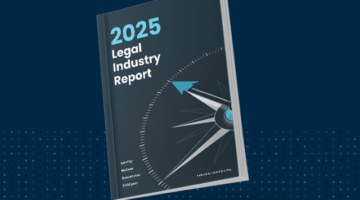 Student loan debt is second only to mortgage debt. Forbes calls it a $1.3 trillion dollar crisis.
Student loan debt is second only to mortgage debt. Forbes calls it a $1.3 trillion dollar crisis.
Borrowers defer buying homes, getting married, having kids, and all those indicia of post law school in order to service that debt. Government seems to take glee in pouring it on student loan borrowers since student loans are not dischargeable in bankruptcy.
Another potential pouring it on: one of the many changes that the House of Representatives is suggesting in its proposed tax reform legislation is something that law students and millennials, or for that matter, anyone who pays on student loan debt (and that can be people even in their sixties), should know about. The legislation would kill the student loan deduction. Right now, borrowers can deduct student loan interest, but that will go down the tubes (along with a long list of other deductions) if the bill becomes law.

2025 Legal Industry Report: Key Insights for Law Firm Growth & Efficiency
Is your firm keeping up with legal finance and tech trends? The 2025 Legal Industry Report shows how firms optimize cash flow, automate payments, and use AI. Download now for key insights.
There’s also pending litigation about who qualifies for the Public Service Loan Forgiveness program.
But wait! There’s more. All of this tsurris (a Yiddish term for grief and aggravation) is enough to make prospective law students think more than twice about whether spending all this money for a legal education only to graduate, pass the bar (fingers crossed), find there are no jobs, and have the collection reps descend en masse. Gotcha!
I just finished reading John Grisham’s latest book, The Rooster Bar. It is, by turns, both hilarious and deeply troubling. It’s all about….wait for it….third year law students at a for-profit law school, who are deeply in debt, who realize that their chances of passing the bar are, at most, fifty-fifty, and that their chances of employment are even less. (Full disclosure: I am on an advisory council of a for-profit law school.)
The name of the law firm that these disenchanted last semester law students create: Upshaw, Parker, and Lane. Do those names mean anything? Hint: take a look at the firm’s initials.

Your Law Firm’s Website Is Failing You.
Here’s What The Best Ones Are Doing Differently.
While the book, which is a quick and easy read and somewhat improbable (although these days, who knows), focuses on the trials (pun intentional) of the three characters, the problem that these kids face (and they are kids) is all too real to be ignored. Throw these twenty-somethings into an oversaturated market from an unranked school and what do you get? Bupkis. (Another Yiddish word, this one for “nothing, zilch, zero, nada.”)
But it’s not just the student loan fiasco that Grisham takes on in the book, it’s also the country’s immigration enforcement policies, deporting people who have lived in this country for decades, albeit undocumented, back to their countries of origin, even if a deportee was a child when his parents came here and the parents have no connection to their home country.
Grisham’s author’s note credits an article in The Atlantic in 2014 by Paul Campos, a law professor at the University of Colorado, with sparking the idea for the book. The article is entitled “The Law-School Scam.” It’s an article everyone in the profession, at whatever stage, and that includes law school educators, should read.
Campos followed that article up a year later, applying the term “predatory behavior” to law schools. The competition for even the barely qualified (even unqualified) law students who have little hope of passing the bar is only getting worse.
Ten years ago, it was predatory lending, and “predatory behavior” is just another variation of that concept, preying on students who want to become lawyers but who may not have the intellectual chops and/or the tenacity to survive the rigors of law school and the bar exam. Just like lenders who enticed prospective borrowers into “no money down” home loans, “evergreen loans,” [e.g. negative amortization] or “Ninja loans,” [no income, no jobs, no asset loans], law schools assure students that they can borrow for their educations, but nobody ever really counsels the students about the “dark side,” e.g. the onerous interest rates and repayment terms, and what their realistic chances are for success in their chosen career. No one tells students about sticker shock, just as no one told homeowners in 2008.
That’s part of the reason that the characters in Grisham’s book don’t think they have anything to lose by ditching law school. At the rate they’re going, even if they finish, pass the bar, and find employment, the money will probably never be enough to repay student loans in full. They think they will always be judgment proof, and so WTF? What have they got to lose?
What is it that legal educators don’t get? What’s the consideration for all these students indebting themselves up to their eyeballs? “I promise to pay you tuition and in exchange, you promise to provide me with a legal education, including doctrinal law and practical skills and the reasonable expectation of passing the bar, so that I can take my knowledge of the doctrinal law and practical skills and earn a living as a lawyer so that I can repay the loans.”
Professor Brian Tamanaha called out legal education some years back in his book, Failing Law Schools. Read it, especially if you know someone thinking about law school, taking the LSAT and getting all starry-eyed about becoming a lawyer. It’s spot on.
Campos, Tamanaha and other law professors such as Stanford’s Paul Goldstein who wrote Legal Asylum, A Comedy, jump up and down (figuratively, if not literally) about the state of legal education in this country. These are law school professors essentially biting the hands that feed them. What does that tell you?
Matt Taibbi, in a scathing article in Rolling Stone, calls out the student loan industry, which is what it is. Although his article focuses on college loans, many law students carry debt from college too and in jaw-dropping amounts. Just ask a couple of my millennial lawyer friends.
So, is legal education a “scam?” A “swindle?” You tell me. The attitude of law schools toward the ever-mounting education costs seems to parrot Mad Magazine’s Alfred E. Neuman’s attitude of “What? Me worry?” Law schools should worry.
Perhaps 1Ls can skip the first year and just take this course instead. They’ll probably learn just as much, if not more, and it’s way less expensive.
 Jill Switzer has been an active member of the State Bar of California for 40 years. She remembers practicing law in a kinder, gentler time. She’s had a diverse legal career, including stints as a deputy district attorney, a solo practice, and several senior in-house gigs. She now mediates full-time, which gives her the opportunity to see dinosaurs, millennials, and those in-between interact — it’s not always civil. You can reach her by email at [email protected].
Jill Switzer has been an active member of the State Bar of California for 40 years. She remembers practicing law in a kinder, gentler time. She’s had a diverse legal career, including stints as a deputy district attorney, a solo practice, and several senior in-house gigs. She now mediates full-time, which gives her the opportunity to see dinosaurs, millennials, and those in-between interact — it’s not always civil. You can reach her by email at [email protected].